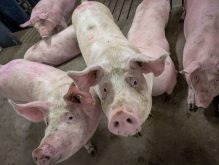Meat-packing giant Tyson Foods’ announcement last week that it will stop buying fed cattle direct from Canadian feedlots is already having an impact on slaughter cattle prices.
“On certain classes of cattle, I’ll bet you it’s 10 cents a pound,” said Doug Richardson, a cattle buyer from Moosomin who ships cattle south.
But Rick Wright, an order buyer for Heartland, said the “huge” volume of cattle moving through auction marts and the limited availability of trucks heading east and west is having a bigger impact.
Read Also

Tie vote derails canola tariff compensation resolution at MCGA
Manitoba Canola Growers Association members were split on whether to push Ottawa for compensation for losses due to Chinese tariffs.
“If there is any price adjustment in the next seven to 10 days, that’ll be the reason, not the Tyson announcement,” said Wright, who added that unlike slaughter cattle, fall calves have so far been spared from any major fallout.
Opinions vary on just how big of an impact the decision will have over the longer term.
Vulnerable
John Masswohl, director of government and international relations with the Canadian Cattlemen’s Association, said that the move by Tyson shows how vulnerable the Canadian beef industry is to political decisions made south of the border.
He noted that Tyson will continue to buy Canadian cattle that have been fattened in U.S. feedlots at two plants in Washington and Nebraska, but only enough to fill their hooks one day a week.
Masswohl said the Tyson decision was “not a surprise” to those following packer sentiment south of the border because it came just ahead of the expiry of the six-month non-enforcement period declared by Washington that “commingling” of foreign and U.S.-born beef would no longer be allowed under the latest revision to country-of-origin labelling rules announced in May of this year.
Firm numbers on how many cattle Tyson was buying prior to the decision are unavailable, he said. But if the rumours that JBS may be preparing to follow suit are true, Masswohl believes the impact on prices north of the border could be severe.
“It may not end there with just that one buyer. If you’ve got the two main U.S. buyers of finished cattle not bidding, and not taking those cattle, there’s a lot of the same elements that we saw in the summer of 2003,” said Masswohl.
Softer tone
Gerald Klassen, a Winnipeg-based analyst, was less pessimistic.
Feeder cattle bids may take on a “softer tone” as buyers shift to a “wait and see” stance, with the full impact not arriving until later in the year.
Also, Klassen wasn’t sure whether the rumours that JBS might follow suit had a strong foundation, and even if they did turn out to be true, idle capacity at Canadian packers would be able to pick up the slack.
“It’s not going to have an impact immediately. One news factor will not drive a market,” said Klassen. “It might deteriorate the basis a little bit, but I don’t see it having a big effect.”
Masswohl said that Canada has traditionally exported more fat cattle to the U.S., but the changes may “flip” the balance in favour of feeder cattle heading south for finishing in American feedlots.
That shift in competition for feeder cattle is sure to hurt the Canadian feedlot industry, which has been hard pressed to generate profits for nearly two years, and is unlikely to do much for cow-calf producers hoping for continued favourable prices amid the annual fall calf run.
“You couldn’t pick a worse time of the year for this to happen. The fall run is when a lot of small cow-calf guys are getting 80 per cent or more of their revenue,” said Masswohl.
Tyson Foods Inc. said it halted purchases of slaughter-ready cattle from Canada as of mid-October due to higher costs associated with mandatory country-of-origin (COOL) labelling, a company spokesman said last Thursday.
COOL significantly increased the company’s costs for additional product codes, production breaks and segregation of product. That product sorting includes a separate category for cattle shipped directly from Canada to U.S. beef plants, Tyson Foods spokesman Worth Sparkman said in an email.














